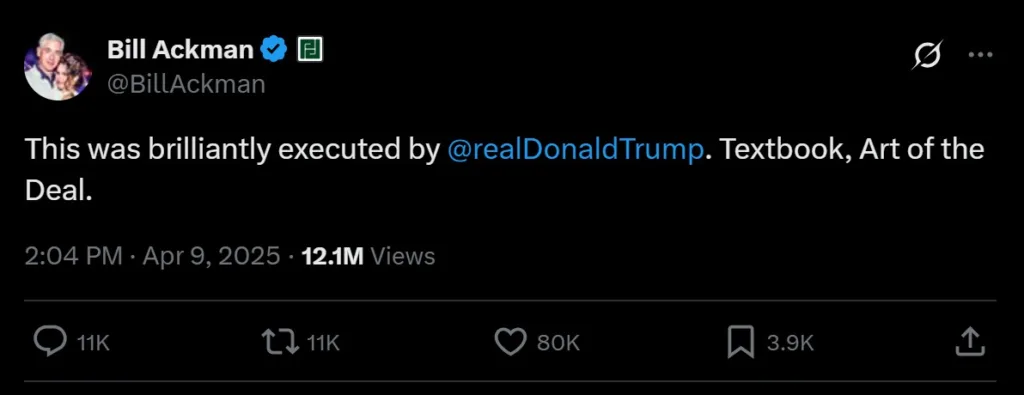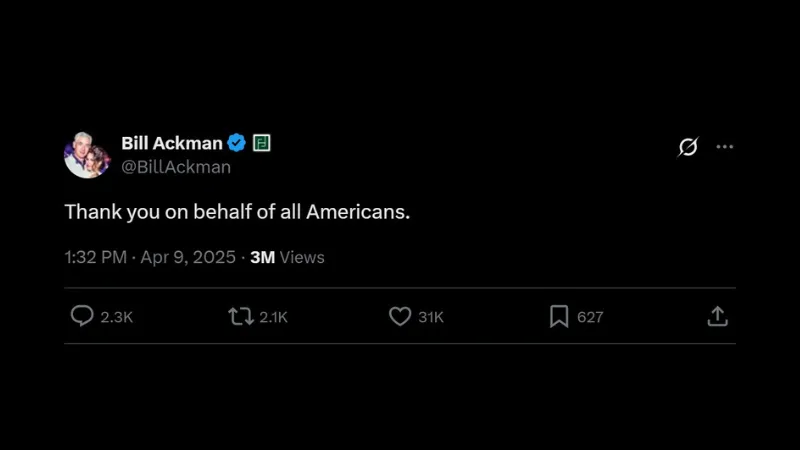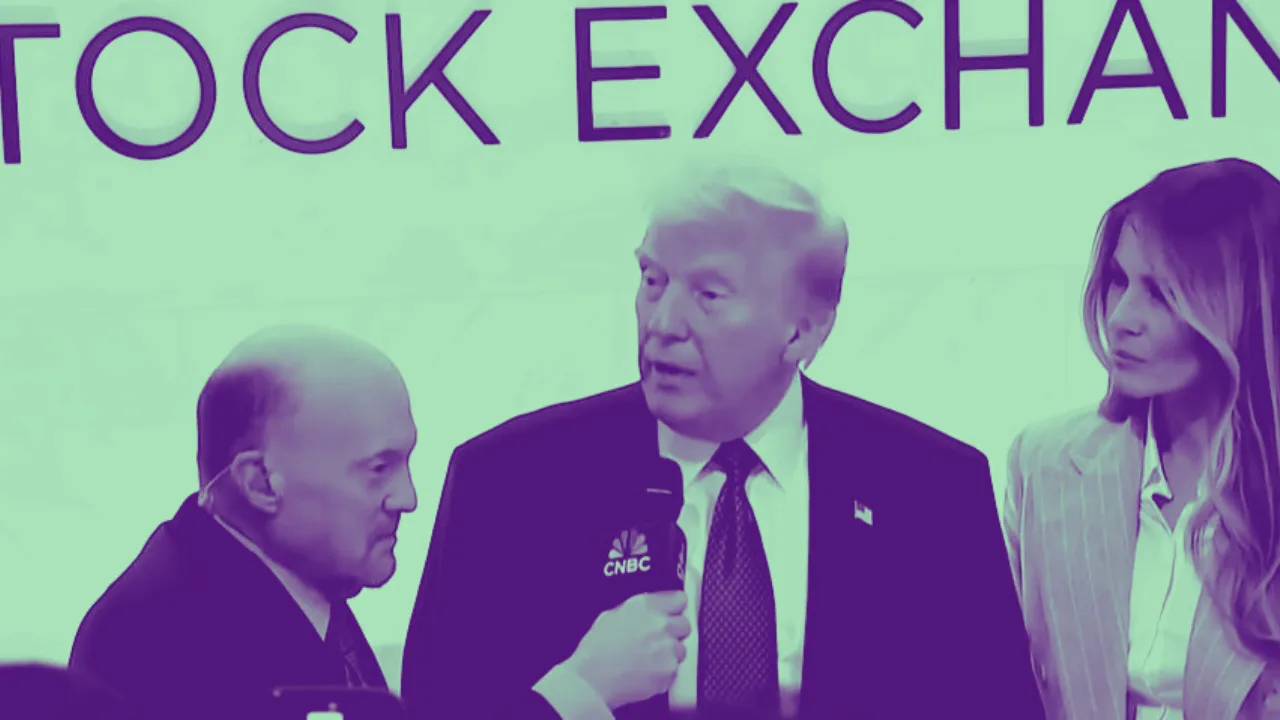Bill Ackman, CEO of Pershing Square Capital Management and a vocal supporter of Trump’s economic policies, highlighted the strategic brilliance of this maneuver. On social media platform X, Ackman enthusiastically praised the President’s tactical approach, describing it as “textbook Art of the Deal,” a nod to Trump’s renowned negotiating style encapsulated in his famous business book.
A Balanced Negotiation Strategy
Ackman believes Trump’s handling of trade issues provides crucial clarity about America’s global trade relationships. In his view, Trump’s assertive approach has effectively distinguished between dependable trading partners and those that present more significant challenges. Ackman underscored this point, commenting, “The benefit of Trump’s approach is that we now clearly see who our preferred trading partners are, and who represents ongoing problems. This clarity sets the stage perfectly for productive trade negotiations in the coming months.”
Furthermore, Ackman offered direct advice to Chinese officials, recommending immediate engagement with Trump to navigate a mutually beneficial path forward. He advised, “China should pick up the phone and call the President immediately. Trump is tough, but he’s a fair negotiator.”
Ackman’s Changing Perspective on Tariffs
Despite his current praise, Ackman’s support has been measured and nuanced. Initially, Ackman endorsed Trump’s aggressive tariff policy as a necessary negotiating tool, intended to reset unbalanced trade dynamics. However, as tensions and tariffs rapidly escalated in recent weeks, Ackman had begun expressing concern about the potential long-term repercussions.
Just days prior to the President’s tariff pause announcement, Ackman warned that Trump’s unyielding approach risked pushing the U.S. economy toward a severe downturn, labeling the scenario an “economic nuclear winter.” Ackman’s caution stemmed from his perspective that sustained tariffs were damaging business confidence and undermining the international economic stability vital to sustained U.S. growth.
Ackman publicly shared this caution on X, remarking, “Business is fundamentally a confidence game. President Trump risks losing the trust of global business leaders if the tariff escalation continues unchecked.”
Navigating Global Market Confidence
Ackman’s observation touches upon a crucial element in global economics—business sentiment. Tariffs can be highly effective negotiation tools when utilized strategically; however, prolonged uncertainty or excessive escalation can disrupt markets, dampen investment, and slow economic growth. Trump’s recent strategic pause appears designed precisely to counteract these negative impacts, providing breathing room for businesses to recalibrate strategies without the threat of sudden, disruptive trade costs.
Market response to Trump’s tariff pause underscores investor confidence in his temporary de-escalation. Major indices, including the Dow Jones Industrial Average, NASDAQ, and S&P 500, saw immediate and significant gains, demonstrating investor relief and optimism regarding short-term economic stability and improved trade relations.
Controversy and Clarification
Interestingly, Ackman’s commentary on trade policies has not been without controversy. Recently, he publicly criticized Commerce Secretary Howard Lutnick, alleging Lutnick profited unfairly from the economic volatility resulting from tariff-related uncertainty by making substantial bets on government bonds. Ackman initially described Lutnick’s actions as an “irreconcilable conflict of interest,” but he subsequently retracted these statements, conceding that his criticisms might have been premature and unfair. He clarified his earlier comments, emphasizing that observers rarely fully comprehend internal decision-making dynamics, saying, “We often don’t fully understand how the sausage is made.”

Implications for Investors and Businesses
Trump’s pause on reciprocal tariffs, combined with continued pressure on China, provides significant strategic insights for investors and businesses navigating international markets. Investors can now anticipate a period of reduced trade volatility, allowing for more predictable market conditions conducive to long-term planning and strategic investments.
Businesses, particularly those heavily reliant on international trade, have an opportunity to reassess their supply chains, investment strategies, and growth plans. Ackman’s enthusiastic endorsement reflects widespread corporate relief, indicating a period of improved economic sentiment and potentially accelerated economic activity over the next several months.
Future Outlook and Strategic Considerations
Looking forward, stakeholders will closely monitor developments during this critical 90-day negotiation window. If Trump successfully renegotiates favorable trade agreements, the U.S. economy could benefit significantly, experiencing heightened market stability, increased investor confidence, and stronger growth prospects. Conversely, if negotiations stall or fail, markets could swiftly revert to volatility.
Ackman’s reaction and the subsequent market rally underscore the sensitive balance between aggressive negotiation tactics and maintaining investor confidence. Trump’s administration faces the complex challenge of driving meaningful concessions from trading partners, particularly China, without causing undue harm to the domestic economy.
Conclusion
President Trump’s tactical decision to pause reciprocal tariffs has demonstrated a keen strategic awareness of the balance required to effectively manage international trade negotiations while protecting American economic interests. Bill Ackman’s commendation highlights both the strengths and potential risks inherent in Trump’s tariff strategy. The coming months will reveal whether Trump’s negotiations achieve lasting benefits for American businesses and the economy at large.
Ackman’s public approval provides a strong vote of confidence from Wall Street, reinforcing the perception of Trump’s strategy as bold yet calculated. Investors and businesses alike now stand poised to benefit significantly if the pause leads to substantive trade improvements. As negotiations progress, the global financial community will remain watchful, with market optimism cautiously tethered to the outcomes of Trump’s high-stakes trade discussions.





